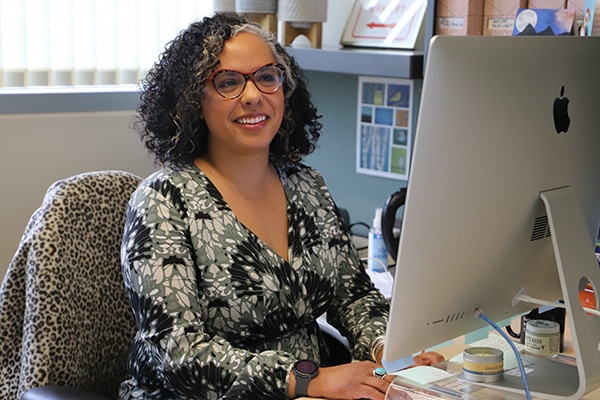Evans chosen for NIMHD Loan Repayment program

In August, Linnea Evans received an award from the National Institute on Minority Health and Health Disparities Loan Repayment Program for her project “Changes in the Daily Lives and Wellbeing of Racial/Ethnic Minoritized Adolescents during COVID-19 and Racial Unrest.”
The highly competitive NIMHD Loan Repayment Program (LRP) offers loan repayment awards of up to $100,000 per year to health professionals with doctoral degrees. In 2020, only 66 awards were made nationally, with a 36% success rate.
“Student loan debt is a major issue for so many people,” said the assistant professor in the Center for Health Equity Research and the Department of Health Sciences. “Initiatives to clear that debt are essential to supporting the wellbeing not only of faculty members, but the many individuals out there that pursued higher education.”
Evans had significant student loan debt from both her undergraduate and Master of Public Health programs that she managed to reduce by half while taking a job after graduation.
“But when I went back for my doctorate, it grew back to the original amount,” Evans said. “And it is a soul sucking feeling to believe that debt will be with you forever and ever. The loan repayment program makes it feel possible that I could clear a large chunk of my debt in the next few years.”
Evans’ project
To qualify for the LRP, awardees must conduct health disparities or clinical research in nonfederal research settings for at least two years. Evans’ project will examine how the effects of COVID-19 may be heightened for adolescents due to changes in education and social-distancing that constrain in-person learning and extracurriculars that are key to development.
“The reorganization of time may be particularly drastic for racial and ethnic minoritized teens, who are more likely to attend remote-only districts, be in families hardest hit by the pandemic, and may be called upon to fulfill roles typically thought to be reserved for adults, absent times of crisis,” Evans said. “Examples include more time in running the household, and caretaking, as well as less time in extracurriculars attached to school.”
Evans believes that the “patchwork system” of in-person and online education across the U.S. may differentially impact the reorganization of daily-time of adolescents by race and ethnicity, though the online education programs may also provide relief for some adolescents from race-related daily microaggressions.
Evans’ study will assess differentials in the reorganization of daily time and stress of adolescents by race/ethnicity and school-delivery mode. Relatedly, pre-pandemic, 92 percent of Black teens reported experiencing three or more microaggressions in a week, often in schools. Forced closures have prompted some families to reconsider in-person learning, in an effort to minimize daily microaggressions.
“This study assessed these effects by surveying adolescents last spring on their daily-time use, daily race-related microaggressions, and examine associations with psychological wellbeing this year,” Evans said.
Evans’ hope is that the results of her project will expose the ways in which the pandemic have exacerbated inequities that already existed, and that “we, as a society, take this time to not look away and return to business as usual, but instead really dig in and take efforts to correct them,” Evans said.